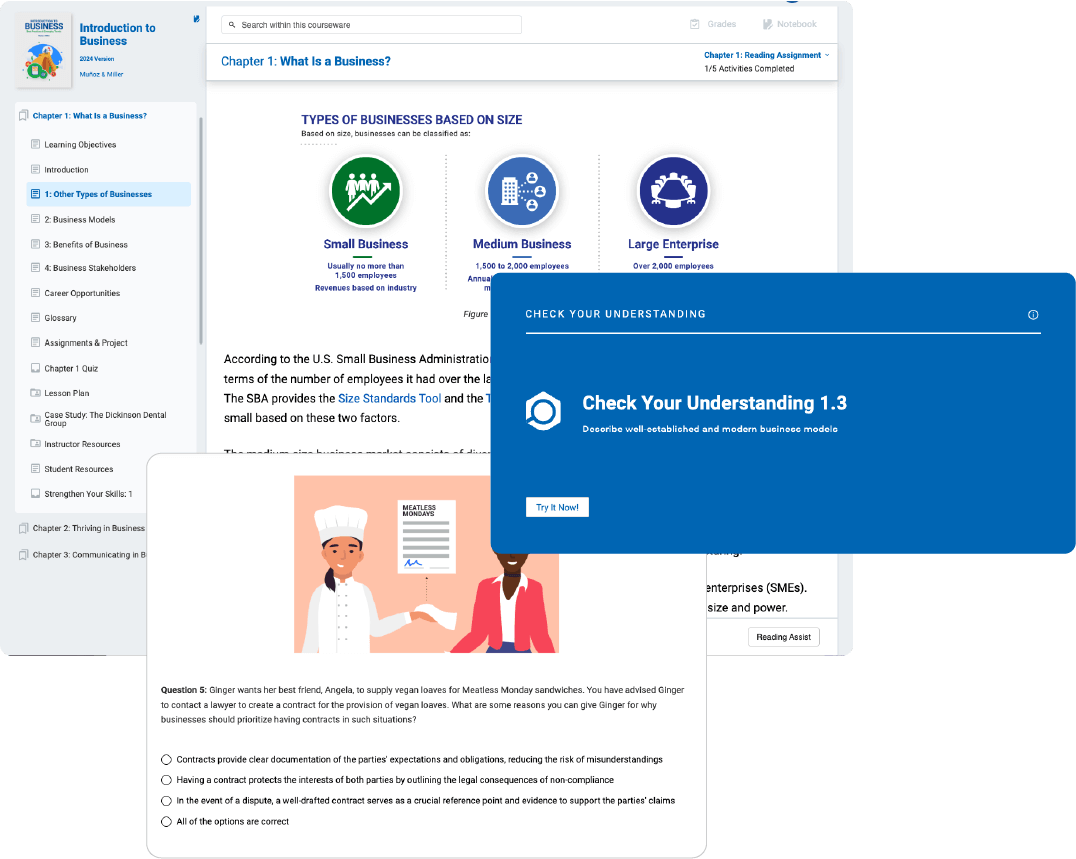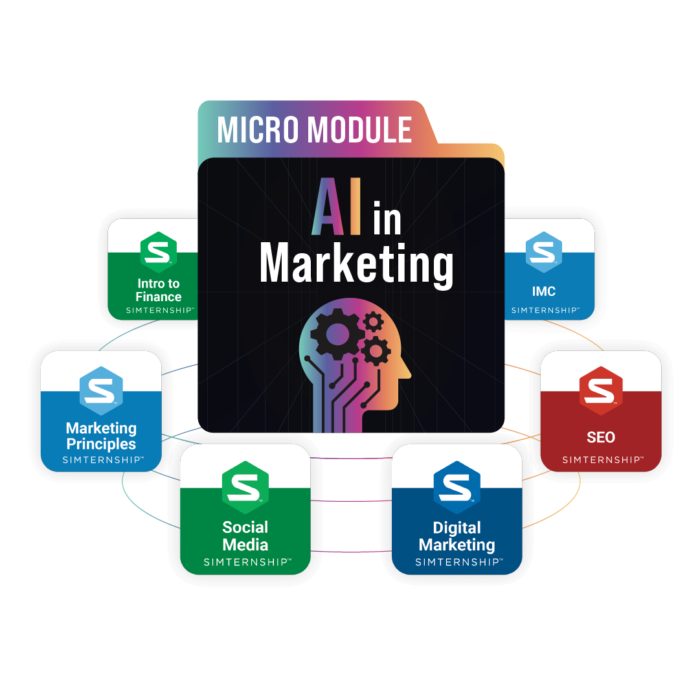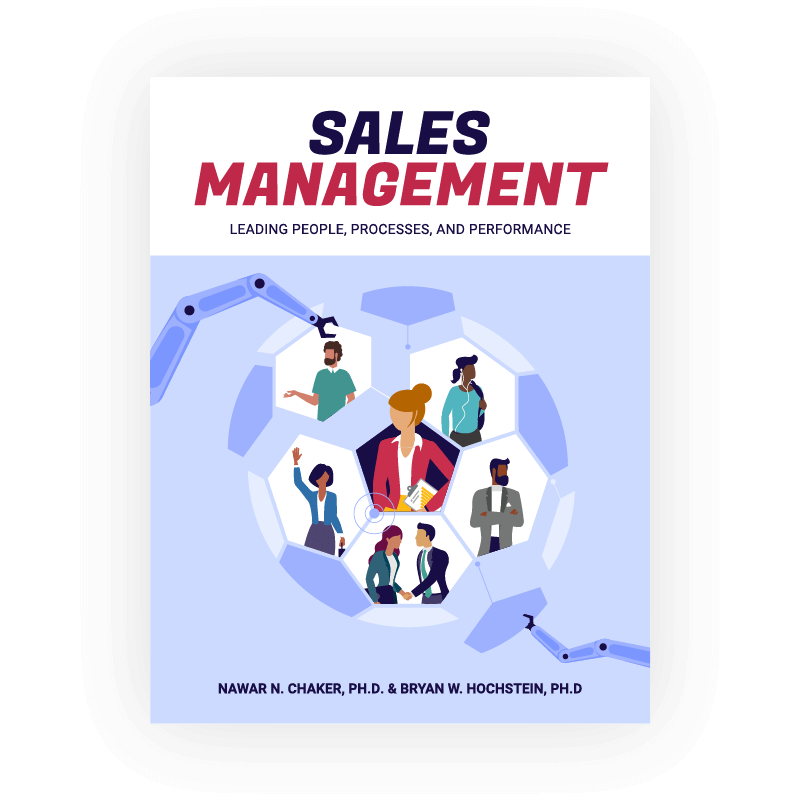
Sales Management Courseware
Prepare Students for Upper-level Sales Management Positions
As you teach your next course on sales management, let the “Sales Management” courseware do the heavy lifting for you! Our innovative curriculum is the ultimate timesaver, as it includes interactive assignments, lesson plans, lecture slide decks, and other resources to keep your students engaged.
The "Sales Management" courseware is designed to help prepare your students to be more employable and prepared to take on specialized sales roles.
What’s Inside
Table of Contents
Learning Objectives
After reading this chapter, students will be able to:
- Explain sales, sales management, and sales leadership
- Differentiate between sales management and leadership
- Describe the reasons why sales organizations are arranged across different levels of leaders and managers
- Illustrate how applying sales strategy relates to how managers help to guide people, process, and performance in their company
- Elaborate on how sales managers assess efforts to help to guide people, process, and performance in their company
- Summarize the unique challenges and demands of the modern sales environment
Learning Objectives
After reading this chapter, students will be able to:
- Define personal selling
- Explain what salespeople do
- Discuss the misconceptions and benefits of sales jobs
- Assess what it takes to be successful in sales
- Categorize the steps in the sales process
- Analyze strategies that utilize different types of salespeople
- Evaluate different types of sales job
Learning Objectives
After reading this chapter, students will be able to:
- Describe the nature of a sales ecosystem and the different kinds of business relationships within it
- Explain why sales ecosystems exist and are vital to sales success
- Summarize the sales manager’s role in navigating sales ecosystems
- Categorize different internal and external touchpoints in a sales ecosystem
- Detail how sales managers can effectively lead across sales ecosystems
Learning Objectives
After reading this chapter, students will be able to:
- Discover why some salespeople don’t make good sales managers
- Summarize the unique aspects and challenges of the sales manager role
- Classify distinct sales manager knowledge, skills, and abilities
- Distinguish sales manager goals and how they can practically be addressed
- Identify how sales managers are compensated and evaluated
- Describe how sales management can be a fulfilling and rewarding career
Learning Objectives
After reading this chapter, students will be able to:
- Explain why strategy is important for sales managers and salespeople
- Detail the levels of strategy in a company and where strategies come from
- Assess types of corporate and generic business strategies
- Differentiate between types of marketing and sales strategies
- Outline the role of salespeople in marketing and sales strategy
- Summarize how sales enablement is effectively implemented
Learning Objectives
After reading this chapter, students will be able to:
- Distinguish between sales ecosystems and sales organizations
- Explain the meaning of organizational structure and sales structure
- Ascertain whether and what type of outsourcing sales is feasible for a company
- Contrast vertical and horizontal organizations and how they relate to sales structures
- Specify the goals and performance implications of organizing the frontline salesforce
- Explore what career opportunities exist for sales managers within the sales organization
- Summarize different types of horizontal organizations in sales structures
Learning Objectives
After reading this chapter, students will be able to:
- Discover the role of technology in sales settings
- Summarize different kinds of sales technologies
- Compare how salespeople and sales managers use sales technology in their roles
- Explain how sales managers use tech stacks to lead their teams
- Specify how sales managers facilitate the use of sales technology
- Assess how sales managers overcome salesperson technology resistance
Learning Objectives
After reading this chapter, students will be able to:
- Discover the importance of data in sales settings
- Summarize five characteristics of big data
- Explain how sales managers use analytics to manage teams
- Compare how sales managers use different types of data in their role
- Specify how sales managers use metrics
- Assess how sales managers develop and refine sales forecasts
Learning Objectives
After reading this chapter, students will be able to:
- Explain the three elements and theories of motivation
- Describe salesperson motivation and how managers can motivate salespeople
- Identify what motivates sales managers and how manager motivation impacts the sales team
- Analyze the advantages and disadvantages of different sales pay structures
- Differentiate between different salesperson compensation components
- Develop strategic sales manager decisions for effective compensation plans
Learning Objectives
After reading this chapter, students will be able to:
- Identify the challenges sales managers face when recruiting, selecting, and hiring salespeople
- Develop salesperson recruiting strategy decisions
- Discuss the importance of diversity in sales
- Categorize the decisions that managers face concerning a selection strategy
- Explain aspects of manager hiring strategies and ways to assess the effectiveness of hiring
Learning Objectives
After reading this chapter, students will be able to:
- Describe the importance of coaching, training, and developing the salesforce
- Explain the objectives and benefits of a learning focus for salespeople, sales managers, and companies
- Identify the obstacles to a learning focus and what managers can do to overcome them
- Plan the aspects of managing the learning focus of a sales team, including the sources, location, segments, and content
- Evaluate what is needed to ensure a credible learning program and the success of a learning focus in sales
Learning Objectives
After reading this chapter, students will be able to:
- Explain the importance of salesperson performance and salesperson evaluations
- Differentiate between sales quotas and other performance factors that managers must monitor and evaluate
- Specify different sales management control systems that managers use to guide and regulate the behavior of sales teams
- Explain how and why sales managers make attributions about salesperson performance
- Justify the advantages and disadvantages of objective and subjective measures that sales managers use to evaluate salesperson performance
- Develop strategies to effectively conduct salesperson evaluations

Embedded Educator Resources
Everything You Need to Teach
Your Best Course
- 12 $ales Wikis
- 60 Check Your Understanding assessments
- 635 Question test bank
- 12 Chapter case assignments + quizzes
- 12 Chapter lesson plans
- 12 Chapter lecture slides
- 12 Chapter quizzes
- 12 Chapter quiz review answer slides
- 2 Course projects
- Midterm + Final Exam

Feels built-in, not bolted on
Micro Module: AI in Marketing
Included for FREE with any Stukent Marketing Simternship or courseware!
The Micro Module: AI in Marketing is designed to complement any marketing course. Whether you’re teaching marketing principles, digital marketing, SEO, social media, or other topics, this module adds powerful, up-to-date AI activities to your curriculum.
About the Authors

Bryan W. Hochstein (Ph.D. Florida State University) is an Associate Professor of Marketing at the University of Alabama. Prior to his current role, Dr. Hochstein (Dr. H) was a sales executive with Time Warner Media. Dr. H is considered an academic thought leader on customer success management and sales topics, as such he regularly facilitates academic/industry discussions via thought leadership forums, industry conferences, and research interviews. Dr. H’s research appears in the Journal of Marketing, Journal of the Academy of Marketing Science, International Journal on Research in Marketing, Journal of Retailing, Journal of Service Research, Journal of
Personal Selling and Sales Management, Industrial Marketing Management, Journal of Business Research, Marketing Letters, Journal of Business and Industrial Marketing, Journal of Marketing Theory and Practice, and other leading outlets. From a teaching perspective, Dr. H teaches in and leads the University of Alabama’s Master-level Sales Leadership program.
In addition, Dr. H facilitates doctoral seminars and professional development courses. Dr. H is an author of the textbook “Marketing Strategy,” 8 th Edition (Cengage), which focuses on bringing together strategies to manage disruption and evolving market approaches in ways that improve firm financial performance outcomes. Bryan is also authoring a Stukent courseware that will include 12 chapters and a simulation on Sales Management. Dr. H and his family reside in Northport, Alabama, where they enjoy community, church, and university service opportunities.

Nawar N. Chaker (Ph.D., University of Tennessee) is an Associate Professor of Marketing at the Haslam College of Business, University of Tennessee. He is also the Research Director of the Marketing Insights Program, where he engages and collaborates with corporate partners and other businesses. Prior to joining academia, he spent about seven years in industry, primarily in selling roles. Dr. Chaker’s main research interests revolve around understanding drivers of salesperson performance, emotions and well-being in sales, the salesperson/sales manager interface, cross-functional sales relationships, and frontline employee management. His research has appeared in the Journal of the Academy of Marketing Science, Production and Operations Management, Decision Sciences, Journal of Service Research, Journal of Business Ethics, Industrial Marketing Management, Journal of Personal Selling & Sales Management, and others. He is also a senior editor at the Journal of Personal Selling & Sales Management and an editorial review board member at the Journal of the Academy of Marketing Science, Industrial Marketing Management, Journal of Business, and Journal of Marketing Theory and Practice.
Hands-on Learning without the Hassle
Stukent Simternships integrate with your favorite LMS platforms
Single Sign-on
Grade Book Syncing
Deep Linking
Rostering





